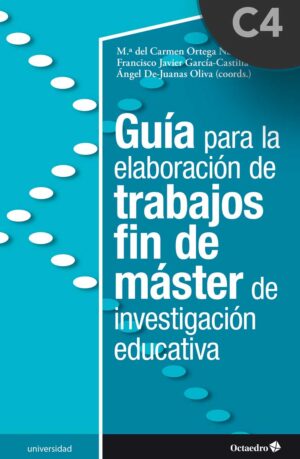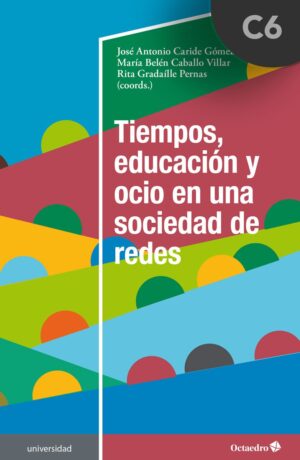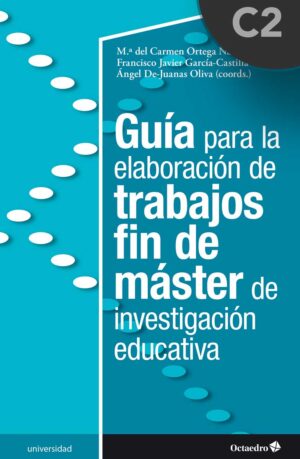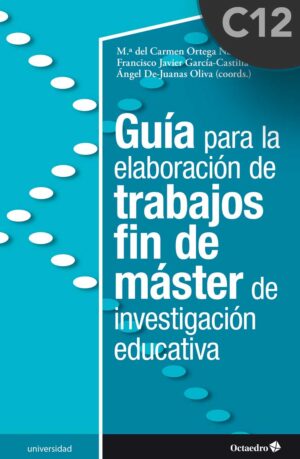
FICHA TÉCNICA
Fecha de publicación:
01/03/2026
DOI: https://doi.org/10.36006/16145-06
Título del libro: Innovación e investigación sobre el aprendizaje ubicuo y móvil en la Educación Superior
URL del libro: Innovación e investigación sobre el aprendizaje ubicuo y móvil en la Educación Superior
ISBN:
DOI del libro: https://doi.org/10.36006/16145
Abstract
La integración de la tecnología móvil en las instituciones educativas, y más específicamente en las aulas, se está llevando a cabo de forma gradual, siendo todavía una realidad emergente en la educación universitaria. En los últimos años, el uso de aplicaciones basadas en dispositivos móviles para promover el aprendizaje activo, y también para monitorear y evaluar el aprendizaje de los estudiantes en tiempo real, está despertando tal interés entre los docentes e investigadores que se están fomentando numerosas innovaciones en metodología de enseñanza. Este capítulo presenta una experiencia basada en el uso de Socrative en Educación Superior.
Palabras clave
Autores
Cómo citar
Carlos Hervás-Gómez, Víctor Hugo Perera Rodríguez y Juan Jesús Torres-Gordillo (2021). Innovación evaluativa con sistemas de respuesta inteligente: Uso de Socrative en Educación Superior. En Carlos Hervás-Gómez, Esteban Vázquez-Cano, José María Fernández-Batanero y Eloy López-Meneses (eds.). Innovación e investigación sobre el aprendizaje ubicuo y móvil en la Educación Superior (pp. 75-86). Octaedro. https://doi.org/10.36006/16145-06
Referencias bibliográficas
- Balta, N., Perera, V.H. & Hervás-Gómez, C. (2017). Using socrative as an online homework platform to increase students’ exam scores. Education and Information Technologies, 23(2), 837-850. Doi: 10.1007/s10639-017-9638-6
- Calamas, D. (2014). An assessment of an innovative student response system on student learning and performance. In Proceedings of ASEE Southeastern Section Annual Conference, Mercer University, Macon. Recuperado de http://digitalcommons.georgiasouthern.edu/mech-eng-facpubs/2.
- Dahlstrom, E., Walker, J. D. & Dziuban, C. (2013). ECAR study of undergraduate students and information technology (Research report). Louisville, CO: EDUCAUSE Center for Analysis and Research, September 2013. Recuperado de https://library.educause.edu/resources/2013/9/ecar-study-of-undergraduate-students-and-information-technology-2013
- Dervan, P. (2014). Increasing in-class student engagement using Socrative (an online Student Response System). The All Ireland Journal of Teaching & Learning in Higher?, 6(3), 1801-1813.
- González-González, I. & Alcaide-Muñoz, C. & Jiménez-Zarco, A. (2018). Using Socrative App for Accounting Students in Higher Education. In A. Misseyanni, M. D. Lytras, P. Papadopoulou & C. Marouli (Eds.), Active Learning Strategies in Higher Education (pp. 293-313). England: Emerald.
- Hadiri, Y. (2015). Instructional Design project: Click it to Check it. Socrative for student assessment in higher education. PowerPoint presented at the Technology, Colleges, and Community Worldwide Online Conference. Retrieved from URL https://scholarspace.manoa.hawaii.edu/handle/10125/35948
- Liu, D. Y. T., & Taylor, C. E. (2012). Engaging Students in Large Lectures of Introductory Biology and Molecular Biology Service Courses Using Student Response Systems, 154–162.
- Looi, C.-K., Sun, D., Seow, P., & Chia, G. (2014). Enacting a technology-based science curriculum across a grade level: the journey of teachers’ appropriation. Computers & Education, 71, 222-236. doi: 10.1016/j.compedu.2013.10.006
- Montrieux, H., Vanderlinde, R., Courtois, C., Schellens, T., & De Marez, L. (2014). A qualitative study about the implementation of tablet computers in secondary education: the teachers’ role in this process. Procedia – Social and Behavioral Sciences, 112, 481–488. doi: 10.1016/j.sbspro.2014.01.1192.
- Palalas, A. (2013). Preparing Mobile Learning Strategy for Your Institution. Proceedings of the12th World Conference on Mobile and Contextual Learning. doi:10.5339/qproc.2013.mlearn.32
- Quiroga-Estévez, Mª A., Fernández-Sánchez, J., & Escorial, S., (2014). Uso de móviles y tabletas para la evaluación de los conocimientos adquiridos: hagamos asequible la evaluación continua. [Proyecto de Innovación Docente]. Retrieve from URL http://eprints.sim.ucm.es/28544/1/Memoria_2014_110-200115_final.pdf
- Traxler, J. (2007). Defining, Discussing and Evaluating Mobile Learning: The moving finger writes and having writ …. International Review of Research in Open and Distance Learning, 8(2). doi: 10.19173/irrodl.v8i2.346.
- Vasconcelos, S. & Balula, A. (2017). Socrative: Using mobile devices to promote language learning. In M. Mills & D. Wake (2017). Empowering learners with mobile open-access learning initiatives (pp. 242-264). USA: IGI-Global. 10.4018/978-1-5225-2122-8.
- Wash, P. D., & Freeman, G. G. (2013). BYOD – engaging students using their own devices. National Social Science Technology Journal, 3(1). Retrieved from URL http://nssa.us/tech_journal/volume_3-1/vol3-1_article8.htm
Mostrar referencias bibliográficas
- Balta, N., Perera, V.H. & Hervás-Gómez, C. (2017). Using socrative as an online homework platform to increase students’ exam scores. Education and Information Technologies, 23(2), 837-850. Doi: 10.1007/s10639-017-9638-6
- Calamas, D. (2014). An assessment of an innovative student response system on student learning and performance. In Proceedings of ASEE Southeastern Section Annual Conference, Mercer University, Macon. Recuperado de http://digitalcommons.georgiasouthern.edu/mech-eng-facpubs/2.
- Dahlstrom, E., Walker, J. D. & Dziuban, C. (2013). ECAR study of undergraduate students and information technology (Research report). Louisville, CO: EDUCAUSE Center for Analysis and Research, September 2013. Recuperado de https://library.educause.edu/resources/2013/9/ecar-study-of-undergraduate-students-and-information-technology-2013
- Dervan, P. (2014). Increasing in-class student engagement using Socrative (an online Student Response System). The All Ireland Journal of Teaching & Learning in Higher?, 6(3), 1801-1813.
- González-González, I. & Alcaide-Muñoz, C. & Jiménez-Zarco, A. (2018). Using Socrative App for Accounting Students in Higher Education. In A. Misseyanni, M. D. Lytras, P. Papadopoulou & C. Marouli (Eds.), Active Learning Strategies in Higher Education (pp. 293-313). England: Emerald.
- Hadiri, Y. (2015). Instructional Design project: Click it to Check it. Socrative for student assessment in higher education. PowerPoint presented at the Technology, Colleges, and Community Worldwide Online Conference. Retrieved from URL https://scholarspace.manoa.hawaii.edu/handle/10125/35948
- Liu, D. Y. T., & Taylor, C. E. (2012). Engaging Students in Large Lectures of Introductory Biology and Molecular Biology Service Courses Using Student Response Systems, 154–162.
- Looi, C.-K., Sun, D., Seow, P., & Chia, G. (2014). Enacting a technology-based science curriculum across a grade level: the journey of teachers’ appropriation. Computers & Education, 71, 222-236. doi: 10.1016/j.compedu.2013.10.006
- Montrieux, H., Vanderlinde, R., Courtois, C., Schellens, T., & De Marez, L. (2014). A qualitative study about the implementation of tablet computers in secondary education: the teachers’ role in this process. Procedia – Social and Behavioral Sciences, 112, 481–488. doi: 10.1016/j.sbspro.2014.01.1192.
- Palalas, A. (2013). Preparing Mobile Learning Strategy for Your Institution. Proceedings of the12th World Conference on Mobile and Contextual Learning. doi:10.5339/qproc.2013.mlearn.32
- Quiroga-Estévez, Mª A., Fernández-Sánchez, J., & Escorial, S., (2014). Uso de móviles y tabletas para la evaluación de los conocimientos adquiridos: hagamos asequible la evaluación continua. [Proyecto de Innovación Docente]. Retrieve from URL http://eprints.sim.ucm.es/28544/1/Memoria_2014_110-200115_final.pdf
- Traxler, J. (2007). Defining, Discussing and Evaluating Mobile Learning: The moving finger writes and having writ …. International Review of Research in Open and Distance Learning, 8(2). doi: 10.19173/irrodl.v8i2.346.
- Vasconcelos, S. & Balula, A. (2017). Socrative: Using mobile devices to promote language learning. In M. Mills & D. Wake (2017). Empowering learners with mobile open-access learning initiatives (pp. 242-264). USA: IGI-Global. 10.4018/978-1-5225-2122-8.
- Wash, P. D., & Freeman, G. G. (2013). BYOD – engaging students using their own devices. National Social Science Technology Journal, 3(1). Retrieved from URL http://nssa.us/tech_journal/volume_3-1/vol3-1_article8.htm




